Home Automation System in UAE
(12 products available)A home automation system is essentially a device and system that can allow you to control many functions in your home automatically or from remote locations. Systems can command a host of functions ranging from lighting, temperature control, window coverings, security mechanisms, household appliances, alerts, surveillance equipment, and entertainment systems, among thousands of others. This, in turn, can maximize the ease, energy-saving, and security of your home. This system primarily consists of sensors, controlling devices, and actuators, as illustrated in the diagram. The sensors pick up on light, motion, temperature, and other sensing elements and transmit the data to the main controlling devices. These sensors, which might include thermocouples or thermistors, photodetectors, level sensors, pressure sensors, current transformers, IR sensors, etc., need some further signal conditioning apparatus to attach to the master controller. For instance, you save energy by turning off your lights or turning down your thermostat before leaving your house. Schedules and routines can be established to automate everyday tasks as well. These systems can vary from basic, individual devices to extensive, entire-house systems. The technology is always developing to become more refined and easier to use. If you are looking for a home Automation System in UAE. TradersFind connects you with leading manufacturers across UAE that provide a wide range of systems for your business. Our complete listings and detailed product specifications make it seamless to find the best Home Automation System Companies across UAE to fulfill your requirements
A home automation system is essentially a device and system that can allow you to control many functions in your home automatically or from remote locations. Systems can command a host of functions ranging from lighting, temperature control, window coverings, security mechanisms, household appliances, alerts, surveillance equipment, and entertainment systems, among thousands of others. This, in turn, can maximize the ease, energy-saving, and security of your home.
This system primarily consists of sensors, controlling devices, and actuators, as illustrated in the diagram. The sensors pick up on light, motion, temperature, and other sensing elements and transmit the data to the main controlling devices. These sensors, which might include thermocouples or thermistors, photodetectors, level sensors, pressure sensors, current transformers, IR sensors, etc., need some further signal conditioning apparatus to attach to the master controller.
For instance, you save energy by turning off your lights or turning down your thermostat before leaving your house. Schedules and routines can be established to automate everyday tasks as well. These systems can vary from basic, individual devices to extensive, entire-house systems. The technology is always developing to become more refined and easier to use.
If you are looking for a home Automation System in UAE. TradersFind connects you with leading manufacturers across UAE that provide a wide range of systems for your business. Our complete listings and detailed product specifications make it seamless to find the best Home Automation System Companies across UAE to fulfill your requirements
A home automation system is essentially a device and system that can allow you to control many functions in your home automatically or from remote locations. Systems can command a host of functions ranging from lighting, temperature control, window coverings, security mechanisms, household appliances, alerts, surveillance equipment, and entertainment systems, among thousands of others. This, in turn, can maximize the ease, energy-saving, and security of your home.
This system primarily consists of sensors, controlling devices, and actuators, as illustrated in the diagram. The sensors pick up on light, motion, temperature, and other sensing elements and transmit the data to the main controlling devices. These sensors, which might include thermocouples or thermistors, photodetectors, level sensors, pressure sensors, current transformers, IR sensors, etc., need some further signal conditioning apparatus to attach to the master controller.
For instance, you save energy by turning off your lights or turning down your thermostat before leaving your house. Schedules and routines can be established to automate everyday tasks as well. These systems can vary from basic, individual devices to extensive, entire-house systems. The technology is always developing to become more refined and easier to use.
If you are looking for a home Automation System in UAE. TradersFind connects you with leading manufacturers across UAE that provide a wide range of systems for your business. Our complete listings and detailed product specifications make it seamless to find the best Home Automation System Companies across UAE to fulfill your requirements
View less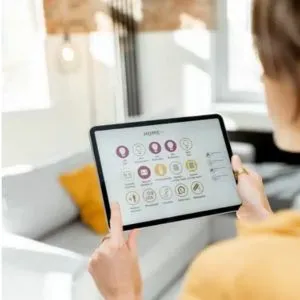
- Usage/Application : Enhancing residential living quality
- Technology Integration : Seamless with existing infrastructure
View more...
Yakka Technical Services LLC
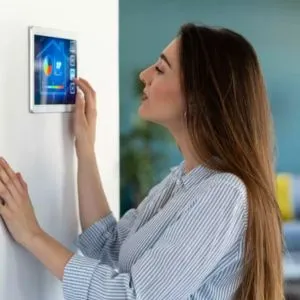
- Control Accessibility : Smartphone or tablet compatible
- Home Security Functions : Access control, alarms
View more...
Iron Logic Systems
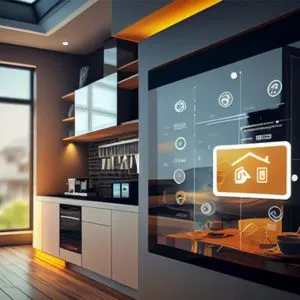
- Control Interfaces : Touchscreens, PCs, smartphones
- System Integration : Affordable, easy interfacing
View more...
DOS Technologies LLC
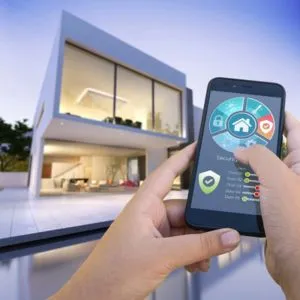
- Energy Efficiency : Reduces energy consumption
- Security Functions : Enhanced safety and monitoring
View more...
SmartE Engineering Services LLC
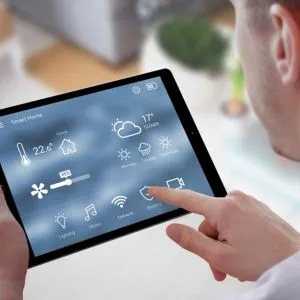
- Control Interfaces : Compatible with smartphones
- System Components : Lights, curtains, HVAC, music
View more...
The Switch Company Smart Home
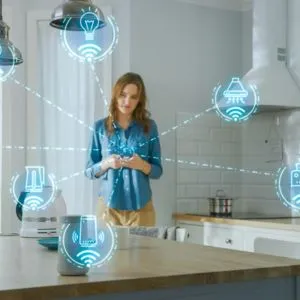
- Specialization : Smart automation, energy, security
- Service Area : Apartments, villas, businesses
View more...
Zyonz Technologies LLC

- Control Capability : All villa lighting types
- Lighting Types : Spots, cove, chandelier, garden
View more...
Rowad Al Hemaya Smart Homes LLC
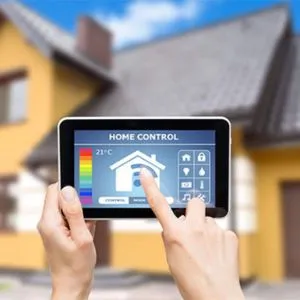
- Core Features : Comfort, security, energy efficiency
- Control Functions : Blinds, lighting, heating, AC, doors
View more...
Al Barq Smart Systems
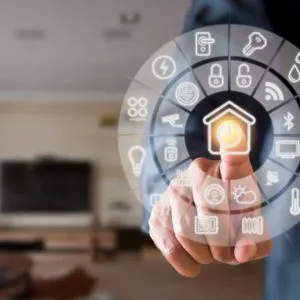
- Focus Areas : New construction & building management
- Standard Protocol : KNX standard for flexibility
View more...
Reels Smart Technologies LLC
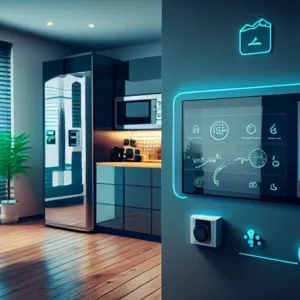
- Control System : Remote management of devices
- Design Options : Multiple customizable designs
View more...
Other Categories
An easy way to post your sourcing requests and get quotes.
- One request, multiple quotes
- Verified suppliers matching
- Quotes comparison and sample request
Home Automation System in UAE
Home automation systems are also becoming increasingly popular alongside UAE focus on smart living and integrating technology into every aspect of life. The home automation system will enable its residents to control lighting, security, climate, and appliances by having a central hub or even an app from a mobile device, thus improving comfort levels, saving energy, and ensuring better security. With its scorching climate, automation through climate control has significantly saved much energy, thereby bringing along cost-cutting along the way. Most of these systems can also do quite well with voice assistants, hence easy to run in any home. With the increased demand for smart home automation systems in residential and luxury real estate, home automation provides modern comfort and energy-saving solutions for UAE residents.
UAE Home Automation System Market Overview
The popularity of home automation in UAE has gained momentum from the recent efforts of modern technology and infrastructure development in that country. Home automation refers to smart home technology in which a homeowner can control and monitor various features of their house, from lighting and security to climate and entertainment, through controlled systems and smartphones or even other devices from a remote location.
A system of interconnected appliances, including voice-activated helpers, security cameras, control of lights, and thermostats, is used to automate and regulate various aspects of the household. Homeowners can now use smartphones and other devices from anywhere in the world for remote monitoring and control. This will allow them to change their settings, use devices, and receive real-time updates from almost anywhere in the world.
Driver: Increasing millennial home ownership around the globe
The increasing ownership of homes is a key factor fueling the use of home automation systems. The majority of new home buyers are Millennials. The largest percentage of home buyers in the US in March 2020 was made up of millennials at 38%, as reported by the National Association of REALTORS. Furthermore, millennials make up the biggest demographic interested in investing in home automation technologies. Consequently, there is a significant increase in the use of home automation systems within this demographic.
Sources:
https://www.marketsandmarkets.com/Market-Reports/home-automation-control-systems-market-469.html
Types of Home Automation Systems in UAE
The type of controls utilized, such as wired or wireless, determines the implementation of home automation. Three primary categories of home automation systems include:
Power Line Home Automation System
This automation is cost-effective and does not need extra cables to transmit data, but utilizes current power lines for data transfer. Nevertheless, this system is characterized by high complexity and requires extra converter circuits and equipment. A power line home automation system uses PLC (Power Line Communication) to transmit control signals over electrical wiring, enabling seamless device integration.
Wired Home Automation System
In this form of automation, all the household appliances are linked to the primary controller (programmable logic controller) via a communication cable. Actuators are connected to the main controller for communication purposes on the equipment. The main controller is constantly in communication with the computer, overseeing all operations in a centralized manner. A wired home automation system with a home monitoring system offers reliable, secure control over devices, ensuring constant surveillance and stability.
Wireless Home Automation
This involves the growth and progress of wired automation, employing wireless home system technologies such as IR, Zigbee, Wi-Fi, GSM, Bluetooth, etc., to enable remote control. For instance, with GSM-based home automation, you can control household devices by sending an SMS to the GSM modem. Wireless smart home and home automation allows seamless control of devices like lights and security remotely, providing energy efficiency and enhanced convenience.
Advantages of Home Automation System
Home automation systems provide many benefits that greatly improve residents' quality of life, convenience, and effectiveness. Some of the main benefits are outlined below:
Increased Convenience
Home automation systems enable the centralized management of different devices and systems, offering an unmatched level of convenience. Users can control lighting, climate, security, entertainment, and appliances through a single app or voice instructions, removing the necessity of individually adjusting every device.
Automation processes and timetables make daily tasks more efficient, like switching off lights and securing doors at night, or activating the coffee machine and setting the thermostat in the morning. Wireless smart home and home automation offers increased convenience by allowing easy, remote control of devices, enhancing daily routines and energy management effortlessly.
Enhanced Security
Home automation enhances home security automation by incorporating smart locks, cameras, motion sensors, and alarm systems. These devices collaborate to offer complete protection. Homeowners have the ability to get immediate notifications on their smartphones regarding any potentially concerning behavior, watch live video footage, and remotely manage locks to guarantee the safety of their property. Automated tasks can mimic occupancy by switching lights on and off, warding off potential intruders.
Energy Efficiency
Enhanced energy efficiency is a major advantage of home automation. Intelligent thermostats, lights, and plugs modify their functioning depending on occupancy, time of day, and environmental factors, minimizing unnecessary energy usage. Monitoring tools for energy offers an understanding of usage patterns, aiding homeowners in pinpointing and tackling high-consumption areas. Energy-efficient automation systems help devices operate only when necessary, leading to reduced utility costs and aiding in environmental sustainability efforts.
Remote Access and Control
Having the capability to remotely manage automation systems provides a major benefit, granting peace of mind and adaptability. Homeowners can keep track of and manage their wireless home systems using smartphone apps or web interfaces, whether they are at work, on vacation, or running errands. This access from a distance enables quick reactions to unforeseen circumstances, like changing the temperature to conserve energy when not at home or letting a family member in who has forgotten their key.
Customization and Scalability
Energy-efficient automation systems offer high levels of customization and scalability, enabling homeowners to begin with a small number of devices and grow their systems at their own pace. Users can customize their wireless home system according to their preferences by incorporating new technologies and devices as needed, due to this adaptability. The capacity to develop customized home automation routines and schedules enhances user experience, offering a personalized solution that adjusts to individual lifestyles.
Technological Trends in Home Automation
Recent advancements in machine-to-machine communication have led to the widespread adoption of home automation technology. The advancement of powerful mobile devices and the Internet of Things(IoT) allows for efficient temperature control, secure wireless home systems, and remote entertainment through interconnected devices.
An Increase in Home Security Automation Systems for Safety Assurance
Security cameras, video doorbells, and other security systems can notify homeowners whenever someone arrives or enters the home. These devices are capable of gathering evidence to record instances of defying a legal order or engaging in criminal behavior. These energy-efficient technologies could help ease the financial burden of living without caregivers.
Smart home automation systems can reassure users by lighting up the house or room. Pet cams and feeders can offer crucial assistance and peace of mind for the well-being and safety of pets while their owners are not at home.
Emphasize AI and IoT-integrated Smart Devices
As newer technologies like the Internet of Things (IoT) and Artificial Intelligence (AI) become more prevalent, the usage of home automation is on the rise. Apple, Google, and Amazon prioritize their smart assistants or artificial intelligence (AI) like Siri, Google Assistant, and Alexa for customized home automation purposes.
Intelligent devices like smart coffee machines, IoT buttons, navigation systems, air conditioners, watering controllers, etc utilize AI and IoT integration to react to user's voice or pre-set AI instructions. IoT frameworks offer the information needed for carrying out particular activities. Integrating AI and IoT into Smart Home automation systems helps cut down on energy costs and enhance security measures.
High demand for Health and Temperature Monitoring Systems
The pandemic has caused individuals to become more aware and attentive to their health and fitness requirements. In 2022, there will be a significant increase in the sales of health monitoring systems integrated with smart home devices. Smart homes often include temperature monitoring devices, exercise gadgets that can track bodily changes, and dietary advice tailored to individual needs as standard features.
Smart homes can identify and monitor fluctuations in health. Integrating sleep monitoring devices into smart home appliance controls can also aid in identifying early symptoms of depression. Different health problems can be suggested by body temperatures.
Increased use of robotic assistants
As the demand for smart home devices rises, an increasing number of homeowners are choosing to incorporate domestic robots into their households to make their lives easier. Basic tasks such as sweeping floors, cleaning pools, and cutting grass can be efficiently handled by these robotic helpers, prompting manufacturers to introduce new models each year to simplify life.
Many homes around the globe have already welcomed household robots. Numerous daily tasks involve tasks such as sweeping floors and cleaning pools, cutting the grass, and using a robot to help as a personal aide. Each year, an increasing number of home automation system companies introduce new robots that simplify daily tasks.
Smart Home Offices Are Boosting Productivity
The growing proficiency of smart home automation system solutions is leading the way for a workforce that is more knowledgeable in technology and digital skills. Smart home appliance controls can enhance work efficiency and promote overall well-being during telecommuting. This aids in dealing with the drastically changed work environments resulting from the pandemic.
Smart home offices are making it easier to switch to working from home or hybrid work setups and unlocking business advantages like improved operational efficiencies, productivity, employee well-being, etc. Smart home offices with home monitoring systems boost productivity by providing a secure, comfortable environment that allows seamless remote control and oversight.
Factors to consider before selecting a home automation system
The concept of the best smart home automation system is gaining more and more popularity. Home automation provides unparalleled convenience and control. Homeowners can easily manage lights, temperature, security, and entertainment by simply pressing a button or giving a voice command. Nevertheless, with the wide range of choices accessible, selecting the appropriate home automation systems can be overwhelming. Key factors to keep in mind when choosing the most appropriate home automation system services for your residence.
Key considerations for a home automation system:
Compatibility with Infrastructure
Assessing your current home infrastructure is vital before delving into the realm of home automation to ensure compatibility. Take into account the new system's compatibility with your current wiring, Wi-Fi signal, and the devices you have. Choosing a system that integrates well with your current appliances and devices is usually a more economical option than starting fresh. Cloud-based home automation enhances compatibility with existing infrastructure, enabling seamless integration, remote access, and scalability without extensive hardware modifications.
Scalability and Flexibility
The field of home automation is always changing, not staying the same. The characteristics and capabilities you want at present may not match your requirements in the future. It is essential to select a system that is not only effective in the present but also flexible for the future. Look for a system that is great at adapting and expanding, easily incorporating new devices and functions to match the evolution of your lifestyle. This forward-thinking ensures that the best smart home automation system will evolve alongside you, making it a wise investment for years to come.
User Experience and Interface
The ideal automation system features a simple and easy-to-use interface. Whether through a mobile app, a wall-mounted panel, or voice commands, the method of interaction should be simple and enjoyable. Try out the system before buying to make sure it meets your ease-of-use expectations.
Security Features
Select a system with strong security features to prevent hacking and unauthorized access. Security is of utmost importance as home automation systems become integrated with your home's network. Make sure it has secure communication protocols and provides frequent software updates to protect your home's digital integrity. Cloud-based home automation enhances security features by providing real-time alerts, remote monitoring, and secure data storage, ensuring comprehensive home protection.
Integration with Smart Assistants
Incorporating smart assistants such as Amazon Alexa, Google Assistant, or Apple's Siri can greatly improve the capabilities of your best home automation system. Make sure the system you select works with the assistants you are using or intend to use.
Cost
Cost is a crucial element when selecting the best home automation system. Take into account the overall expenses in the long run, such as upkeep, enhancements, and energy usage, not just the initial buying price. Create a practical budget that takes these factors into account and adheres to them.
Energy Efficiency
A frequently ignored element of home security automation is energy efficiency. Monitoring and controlling energy usage through systems can result in substantial cost savings over time. Search for functions such as intelligent thermostats, energy tracking, and automated lighting setups.
Brand Reputation and Support
Select a brand known for its quality reputation and customer support. Look up reviews on the internet and seek advice from friends or family members. Effective customer service can have a significant impact, particularly when you face problems or require help with your system.
Find the best Home Automation System Companies on TradersFind
TradersFind is a reliable platform for those who are looking for a Home automation system in UAE. You can find reliable Home Automation System Services across UAE and get complete details such as contact details, location, or WhatsApp number.
Through that, you can get in touch with smart home automation system solutions. In short, TradersFind is the right platform for you to connect with the leading Home automation system companies across UAE without any difficulty.
Frequently Asked Questions (FAQs)
Q: What are the 3 common uses of home automation systems?
A: Home automation system is commonly used for three purposes:
Lighting control: Home automation lets you manage and set schedules for lighting systems, leading to energy savings, convenience, and the ability to adjust ambiance.
HVAC control systems: Automate the regulation of temperature, humidity, and ventilation to enhance comfort and energy efficiency.
Security and Monitoring: Home automation merges security systems, like cameras, door locks, and alarms, to offer remote monitoring, access control, and improved safety features for homeowners.
Q: How does a home automation system work?
A: It connects smart devices through a network, often Wi-Fi or Bluetooth, and uses a central control unit or app to manage them, allowing for automation or remote control.
Q: What can be automated in a home security automation system?
A: Some of the common devices include lights, thermostats, security cameras, locks, blinds, appliances, and even smart entertainment systems.
Q: Is home automation safe?
A: A home automation system can be pretty secure when set up with strong passwords, encryption, and regular updates, but best practice for IoT security is always in order.
Q: Does home automation save energy?
A: Yes, because automation of lighting, HVAC, and appliances will be more efficient in using energy, hence reducing utility bills over time.
Q: Can I control my home automation system remotely?
A: Yes, most systems have remote control via smartphone apps, so you can monitor and control your home from anywhere with an internet connection.
Q: Is home automation compatible with voice assistants?
A: Many of these devices can work well in conjunction with voice assistants like Amazon Alexa, Google Assistant, and Apple Siri which allow the user to voice-control the system without the need for much hands-on activity.
Q: How much does a home automation system cost?
A: Cost varies between a few hundred dollars for one of the simpler devices and many thousands of dollars for an entire home automation package.
Copyright © 2024 Interconnect Marketing Management L.L.C All rights reserved.















